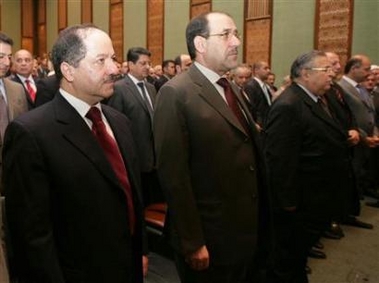
Sat Aug 18, 2007 | By Mariam Karouny
BAGHDAD (Reuters) - Iraq's political leaders held "cordial but candid" talks on Saturday in an attempt to revive national reconciliation efforts and repair the fractured unity government.
The five leaders, representing Iraq's majority Shi'ite Muslims, Sunni Arabs and Kurds, met for about 90 minutes and are expected to meet again on Sunday, Deputy Prime Minister Barham Salih told Reuters.

It was the first time they had met for two months.
"The meeting was cordial but characterized by candid discussion of the issues and a sense of responsibility to resolve the political crisis afflicting the country," Salih said.
Prime Minister Nuri al-Maliki is under growing pressure from Washington, which is frustrated by negligible political progress while its troops step up operations to quell sectarian violence.
Maliki attended the talks with President Jalal Talabani, a Kurd, Sunni Vice President Tareq al-Hashemi, Shi'ite Vice President Adel Abdul-Mahdi, and Masoud Barzani, president of the semi-autonomous Kurdistan region.
Salih said the leaders discussed the results of preparatory talks that had been going on almost daily since July 15.
The results included tentative agreements on a review of the de-Baathification law, provincial powers and "frameworks for crucial issues dealing with militias, insurgent groups, detainees and powersharing," Salih said.
The de-Baathification law is one of the thorniest issues up for discussion because it proposes easing restrictions on former members of Saddam Hussein's Baath party working in the civil service or the military.
Washington is keen to see signs of political progress towards national reconciliation before a report on U.S. President George W. Bush's Iraq strategy is presented to the U.S. Congress in mid-September.
The report is regarded as a potential watershed in the Iraq war that could trigger a change in U.S. policy.
Democrats in Congress, who want U.S. troops brought home as soon as possible, are likely to seize on any evidence that the strategy is not working.
Maliki's weak and divided government has made little progress in passing key laws aimed at promoting national reconciliation, with political blocs reluctant to compromise. Nearly half his cabinet has quit or is boycotting meetings.
The summit follows the formation this week of a new alliance between the four leading Shi'ite and Kurdish parties, a voting bloc in parliament that cuts across ethnic and sectarian lines and is aimed, said Maliki, at "shaking the political paralysis."
The four parties were unable to persuade the biggest Sunni Arab party, the Iraqi Islamic Party, to join them. U.S. ambassador Ryan Crocker and other observers have questioned the credibility of an alliance without Sunni Arabs.
The Iraqi Islamic Party is the biggest party in the Accordance Front, the Sunni Arab bloc that pulled out of Maliki's cabinet this month in protest at his failure to address their demands for a greater say in government.
Sunni Arabs, politically dominant under Saddam, have accused Maliki's government of marginalizing them and have formed the core of the insurgency against the Shi'ite-led government since the U.S.-led invasion in 2003.
Recently though, a number of tribal sheikhs have formed an alliance with the government against Sunni Islamist al Qaeda, a move that has helped to pacify restive western Anbar province.
Washington has said it hopes drawing Sunni Arabs more firmly into the political process and addressing their grievances will help ease sectarian tensions that have, by the most conservative count, killed tens of thousands.
Seven people were killed on Saturday when an estimated 17 mortar rounds rained down on a market, residential areas and a hospital in the town of Khalis, north of Baghdad, police said.


